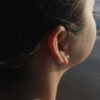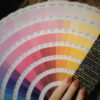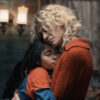From the very origins of “Him,” Tess Higgins and Rebecca Wahls had bigger ideas in using the backstage parameters of a dating show to look at the lives of the women that somehow found their way there.
“From the beginning, Tess had written in these moments of heightened realism where one of the characters had these flashback dreams in a pool and on her high school stage and there was this climactic scene that’s always been called “the art project,” where our women, without giving too much away, express themselves in pretty theatrical ways in an attempt to get revenge on their suitor,” Wahls said, noting the ambition of a story originally conceived as a play. “When we did a staged reading, someone in the audience [actually said], ‘How are you going to do any of that on stage?” And there are ways — but that comment always like haunted me in the back of my brain. [When we made the film] I was like, ‘Well, we don’t need to do it on stage. We can do it on camera.’”
It paid off to listen to the little voice in her head for the director that others may have told her to downplay, as it eventually does for those on screen in writer and star Higgins’ delightfully barbed comedy where contestants on a reality show vying for the heart of an eligible bachelor – though the show shouldn’t necessarily be confused for that one – learn of possible deceit within their ranks and contend with a growing sense of self-deception for sticking around. One doesn’t need to see either Jeff, the show’s main star or Xav, its Svengali producer (Troy Baker, whose baritone voice will be familiar to anyone who’s played “The Last of Us”), to see the effects they have on the quintet of Jenna (Kira Omans), Shana (Higgins), Savannah (Sydney Battle), Claire (Margaret Berkowitz) and Adrianne (Lucie Solène Allouche), who have made it past one elimination round after another only to receive the grand prize of remaining in a villa where none of the seven TVs in the house have remotes, phones have been confiscated and the fridge has been mostly left bare.
Still, the women notably don’t take out any anger or resentment on each other and only start suspect something’s amiss when a production folder is accidentally left behind on some furniture, throwing the villa into chaos. The results of the show might be preordained, but the reactions of the contestants to this revelation are anything but and as much as producers Sarah (Lisa Barnes) and Greg (Kyle Prue) come in to calm nerves and attempt to steer the final five towards saving the drama for the screen as they’ve done all throughout the production, Higgins and Wahls consider the epiphany to be first among many for the group who start to feel comfortable looking to each other to put their own lives in perspective more clearly. After premiering early this year at the Sedona Film Festival not far from where Higgins and Wahls set up their bachelor pad for the film, “Him” has been charming audiences across the country on the festival circuit, and as it makes its way east for a stop at the Woods Hole Film Fest in Massachusetts, the filmmakers generously took the time to talk about the evolution of the sharp satire from the stage to the screen, conveying the intensity that was in the room during the shoot and the benefits of a central location that Higgins was all too familiar with.
How did this all start?
Tess Higgins: I wrote the first version of it in 2018. I am very tuned into the reality TV world and have been for a long time. “The Bachelor” is the show that I know the most about and everything that happens to the women in this film is something that has happened to a contestant at one point or another in history. Rebecca likes to describe it as like we “Handmaid’s Tale-d” it, because in “The Handmaid’s Tale,” Margaret Atwood only wrote about things that happened in other oppressive communities over history, so we did something similar — getting you to talk about your sister who died and you’re crying about that, but they make it look like you’re crying about “The Bachelor” in the way that they edited it, or withholding food, sleep, water, medication, and bribing you to talk shit about somebody by dangling privileges over your head. [The producers of those shows] really do have a crazy amount of control and a lot of contestants, after the experience, will say, “I really believed I was in love because I had nothing else to do.” And then you come home and like a couple months go by and you’re like, “Oh, I don’t know about that anymore.” [The experience is] so isolating and we thought that would make a really ripe environment for storytelling.
Rebecca directed a staged reading of that play at a theater in the D.C. area where we both lived at the time. That went well. And then a couple of years later, she [said], “I think this would make a great movie,” so we adapted the script together, just for fun at first, and then it really turned into something.
Rebecca Wahls: I had started graduate school for theater in fall of 2020, and I was really lucky that my faculty advisor was actually really ahead of the curve with the COVID learning [situation], so she suggested that we add film courses to our master’s in directing course load. I was also lucky enough that first semester to have a class with Andy Wolk, a wonderful director who directed episodes of “The Sopranos” and “Ugly Betty,”and as soon as I got to school, I realized that film was a really exciting way to tell a story, so when Tess [had this idea], I thought, “Well, this takes place in essentially one location, and the budget side of my brain is like, “Where, where?” and the creative side of my brain is like, “This could be a cool exercise to try to adapt this stage play into a film.” Originally [as a play, this] was 120 pages long, and I can’t stress enough how much teamwork was involved, but we whittled it down to the 80-page screenplay, which we shot and is now an 80-minute film.
It’s got a great cast. How did you find the bachelorettes beyond Tess?
Rebecca Wahls: Which is so funny because in 2018, when we were both in D.C., I remember being surprised that Shana was who you wanted to be. I figured [Tess would] want to be Jenna. Shana’s scary, and Tess was not playing villains at the time. But it is unbelievable how good Tess is in this role that I never at that point would have imagined, so it’s just a great lesson in how you can mold yourself as an actor to be whatever you want to be. And a lot of these roles we had particular women in mind for. Because we got their greenlight relatively early on, we could craft stories that matched their lived experience in certain ways. For instance, Kira Omans, who plays Jenna, is a fantastic actor out in L.A., and we knew she was super-athletic so we knew she could handle all of the swimming stuff [in the heightened reality scenes]. Sydney Battle, who plays Savannah, is someone that Tess knew from college…
Tess Higgins: She’s a hilarious sketch comedy person and writer…
Rebecca Wahls: Yeah, wrote on the Emmys, so we were lucky to have very talented friends in many circumstances. The more wild casting stories have to do with the men because we didn’t have anyone in our circles who fit the bill for Greg, the producer who is around the most, so Tess had the great idea to just start messaging comedians on TikTok who we thought were funny and could potentially play the part. We just cold e-mailed a couple of them and they said they’d audition. We were lucky enough to meet Kyle Prue that way, who has this popular TikTok series called “10 Ways to Piss Off Men,” so we thought he can play the jerk, but he is an ally underneath that and he just turned out to be the most wonderful person to work with.
Then our big star, of course, has an unusual role in this film — Troy Baker, who plays the role of Xav, this mysterious off-screen lead producer of the show. This is another one of the things that calls back to the original theatrical style of it. When Tess originally wrote this play, this producer did not have a name and was never meant to be seen. On stage, we were imagining these scenes [where] one of the women sits in a chair and a spotlight and the voice from on high questions her and makes her doubt herself. In film form, it’s so much more exciting because these five scenes essentially became really intimate character studies of each of the girls and I don’t remember where the idea came from, but we thought we could have the best voice possible on the other side of the camera and I play a lot of video games. And Troy Baker is, as Tess’ improv teacher likes to say, “the Tom Cruise of video game acting,” so we figured why not try? And the lesson that we learned with a lot of this film is if we try, sometimes people will say yes. And he said yes. That was the coolest Zoom of our lives, other than this. [laughs]
The other piece of crucial casting is this fabulous house. It looks like “The Bachelor” really could be shot there.
Rebecca Wahls: It does, doesn’t it?
Tess Higgins: That is my parents’ house, partially. The indoors is my parents’ house. The outdoors was a completely different place, but a big reason that we wanted to shoot it in Sedona was because we could get access to all of these nice locations for free. It put a lot of stress on me and my family, but it looks amazing, so I can’t complain.
Rebecca Wahls: And that outdoor pool location with the grand staircase was someone in the neighborhood who was very gracious to let us use that awesome, awesome pool spot for those nighttime scenes and the climax, so we were really lucky.
Tess Higgins: We couldn’t have done it without [the Sedona community]. We had a lot of donated housing and people in the community offering transportation. One of my parents’ neighbors drove like the equipment grip truck two-and-a-half hours up from Phoenix for us. We had someone from the golf club help drive people around. My brother flew out for a while and picked up food and he was even a PA in some moments, so that was a really cool part of it and you think about how much was given to us in terms of help, if we had to pay for that, it would be a much bigger budget movie. [Fortunately] we shot it in the dead of winter, and no one’s really going to Northern Arizona at that time of year because it actually gets cold, so we really felt like we almost had the town to ourselves and it was easy to get stuff done.
One scene I had to ask about is when the bachelorettes set up a meeting in the bedroom, a really pivotal moment in the film that is so dynamic in terms of lighting and camera movement despite the single setting. What was it like figuring that out?
Rebecca Wahls: That is the master bedroom in Tess’s parents’ house, and the trick in the end was that there is a hallway in that room that you do not see in the film, so that hallway became an essential spot for [staging] and there was always someone hanging out in that hallway, like dangling a light in the middle of the room. It was just like the perfect little hidey hole for us [crew] to crouch in while scenes were playing out. You couldn’t see it in the film because this hallway leads to the bathroom and in the story, there’s no bathroom in this room, so we couldn’t show it. But It was a very ambitious scene.
We shot it over three days and I am really proud of the amount of movement that we managed to get and the amount of different configurations that the girls were able to get into for the blocking of it all. We knew we only had 15 days to get this whole thing done, so before we shot, I blocked every inch of it out in advance. Tess’s dad gave me like the blueprint for their house and we sat on Zoom for just days on end with our director of photography Kevin Galloway and our assistant director Noah Peterson. Tess was already at the house and she would run around with her camera on Zoom and show us the stuff in real life. Fortunately, most of what we planned worked and what didn’t, we came up with better solutions for than what we had imagined.
Tess Higgins: Something that was cool about this process was how collaborative everyone was, coming in with their own ideas or creative problem solving. There’s a moment at the end that we had like written in the script, which involved like locking someone in a room and clearly we couldn’t lock someone in with what we had like on set, so we were trying to think of how do we make this work? And it was our second AC who was kind of quiet, who [said], “Oh, what if you just did this instead?” And stuff like that kept happening where we had to like think on the fly that was very cool to see happen.
This also has a wonderful simmering score. What was it like to put music on this?
Rebecca Wahls: Our score is done by the wonderful Luc Cianfarani, this great composer who lives in New York City and he reached out to us actually based on having seen our Seed&Spark campaign online. He thought that our story sounded interesting, and we really valued working with as many women as possible throughout this whole process, but Luke is a great example of how our priority was always to work with the right fit for our team and for the story. The first question [Luke] asked me was, “Do we want a normal score or not?” And I said, “We don’t want a normal score. Let’s make the score its own character.” And he came back with this idea of having it be almost exclusively vocals — five different women who that we brought into a studio in New York and he recorded singing a bunch of scales and riffs. Then he made custom synthesizers out of each of their voices and that is the score. It’s cool because now, since we did that, that’s something that I’ve actually seen more and more frequently in various films and TV, but the main references we had [when we were working on it] were “The White Lotus” and “Swiss Army Man,” so I feel like we were on the cutting edge of that.
What’s it like to be getting this out into the world now?
Rebecca Wahls: It’s been so crazy. Tess and I have taken on so many responsibilities, and we’ve learned so very much as a result of that. But we were really lucky. This will be our East Coast premiere in Woods Hole, which we’re super grateful for, and we premiered at Sedona, which was the perfect homecoming, and then we played at two festivals in the Midwest, so getting to watch it now with three very different audiences of different sizes and different investment levels [has been interesting]. The Sedona community all wanted us to succeed. But when we were in Iowa, we were like, “Oh gosh, hopefully this goes over well.” But as luck would have it, it was screened in the same ballroom where a Bachelor finale was filmed, so the universe has felt like it is on our side in lots of little magical ways like that.
Tess Higgins: It’s been really great too because we’ve lived in this world of this story for six years now, essentially, and getting to see how it lands with the people that we actually want to see it is really rewarding. When we had our screening in Sedona, the guy who runs that festival has a daughter who is 22 years old and finishing her last year of college. She was there to help out during the festival and she loves “The Bachelor,” so she came and saw it and afterwards she [said], “I got every reference. That feels like something I’d watch with all my girls in my dorm room, I loved it.” And I thought, “You’re the person who this movie is for.” And when we were in Iowa, students had free tickets that day to the festival, so there were a lot of young girls whose parents let them skip school to come see our film and that was very affirming.
Rebecca Wahls: Yeah, and those college students too.
Tess Higgins: Yeah, there were a couple of graduating seniors from the film department of the local university who came up to us in the coffee shop the morning after they saw it. And I think it’s easy in 2024 to feel like women have broken through and we’re fine now, but I actually really don’t want to devalue the fact that we are to women who are doing this on our own. There is merit to that and there is inspiration to the folks who are of the generation just behind us, which six years ago was us, so it’s really nice when we get to meet folks like that.
“Him” screens at the Woods Hole Film Festival on August 1st at 8 pm at the Meigs Room at Swope Center.




